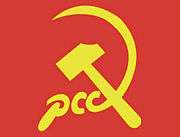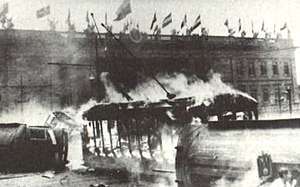Colombian Communist Party
The Colombian Communist Party (in Spanish: Partido Comunista Colombiano) or PCC is a legal communist party in Colombia. It was founded in 1930 as the Communist Party of Colombia, at which point it was the Colombian section of the Comintern, and changed its name in 1991. The party is currently led by Jaime Caycedo[1] and publishes a weekly newspaper called Voz.
Colombian Communist Party Partido Comunista Colombiano | |
|---|---|
 | |
| Leader | Jaime Caycedo |
| Founded | 1930 |
| Headquarters | Bogotá |
| Newspaper | Voz |
| Ideology | Communism Marxism–Leninism Bolivarianism |
| Political position | Left-wing to far-left |
| National affiliation | Patriotic March |
| International affiliation | FSP IMCWP ICS (Inactive) |
| Website | |
| www | |
| La Violencia |
|---|
 |
| Prelude |
| Political parties |
| Presidents of Colombia |
| Part of a series on |
| Communist parties |
|---|
|
Africa
|
|
Europe
Former parties |
|
Oceania
Former parties
|
|
Related topics |
|
The Revolutionary Armed Forces of Colombia (FARC) was founded as the armed wing of the PCC in 1964, but the two organisations separated in 1993.[2]
History
In the mid-1960s the U.S. State Department estimated the party membership to be approximately 13,000.[3]
Three members of the PCC were known to have undergone training with the East German Ministry of State Security (MfS); such courses, provided by the "Task Force of the Minister, Responsibility Special Issues" ("Arbeitsgruppe des Ministers, Aufgabenbereich Sonderfragen"- AGM/S) and additionally accompanied by KGB officers, encompassed a wide range of paramilitary infiltration and sabotage techniques, but no additional details are known.[4]
The PCC was a founding member of the Social and Political Front (FSP) party coalition, which later merged into the Alternative Democratic Pole (PDA) alliance. The PCC was expelled from the PDA in August 2012 because of its affiliation to Patriotic March, another political alliance.[5][6]
Relationship with FARC
Early years
During and following the La Violencia civil war that erupted in Colombia from the late 1940s to the mid-1950s, the communists developed organic links to several liberal guerrilla and irregular rural forces, most of whom nominally depended on the official Colombian Liberal Party and eventually demobilized by the end of that period. Those groups with more direct relations with the PCC tended to not demobilize, keeping their weapons and organizational structures mostly intact. In 1947, a short-lived Communist Labour Party was formed by former members of the PCC.
Later, in 1964, a section of these guerrillas would develop into the Revolutionary Armed Forces of Colombia (FARC-EP), which initially was considered as the official armed wing of the Communist party. The PCC leadership mostly operated in the cities during the 1960s and 1970s, but it supported the operations of the FARC, regularly holding solidarity and donation rallies for FARC members and units, as well as occasionally providing other forms of aid (supplies, equipment, intelligence, political cadres or ideological literature).
The PCC justified the operations of the guerrillas as the armed component of the fight against capitalism and imperialism in Colombia, while at the same time it continued to participate in legal electoral activities independently. Both activities were considered to have their own place within the so-called "combination of all forms of struggle", a concept often employed by PCC and FARC.
Moving apart
Gradually the PCC and FARC-EP grew apart politically, in particular during the later 1980s. Both organizations had their share of internal debates, for example as to which entity would have greater influence and control over the Unión Patriótica (in the end the PCC accepted FARC supremacy in this regard) during its formation, and later on the issue of continuing to participate in elections as the UP suffered violent suppression (the FARC began to separate itself from legal UP activities starting in 1987).
Other disagreements would include that the PCC may have allegedly tended to follow the changes that developed within the official Soviet line during the Cold War, which the FARC-EP did not consider as strictly binding. After the Berlin Wall fell, confusion among the two sides increased. The principle of the "combination of all forms of struggle" was also brought into question at the time by some members of the PCC and UP leadership. The PCC officially broke with the FARC in 1993.
As a result, a separate Clandestine Colombian Communist Party was officially formed in 2000, though some sort of separate FARC-based internal party structure had been in de facto existence during most of the 1990s. Both organizations have remained completely distinct in their activities, though individual members of both parties may have continued to maintain working relationships on occasion.
Persecution
During most of its history the PCC has been the subject of repression and persecution both by private individuals, active and retired government agents and others. The PCC was severely weakened by paramilitary massacres and assassinations from the early 1980s to the mid 1990s.[7]
A leading PCC figure, Arturo Díaz García, was assassinated on December 21, 2005 in the corregimiento of Toche in the municipality of Ibagué, Tolima. Supporters of David Ravelo, a member of the PCC's central committee who is serving an 18-year sentence for plotting to murder a municipal official, contend that he is a political prisoner who was prosecuted illegitimately.[8]
See also
References
- http://english.pravda.ru/world/americas/22-01-2003/1792-argentina-0/
- "Unity for a Socialist and Revolutionary Colombia: Interview With Carlos Lozano". Counterpunch. 5 August 2015. Retrieved 14 July 2017.
- Benjamin, Roger W.; Kautsky, John H.. Communism and Economic Development, in The American Political Science Review, Vol. 62, No. 1. (Mar., 1968), pp. 122.
- Thomas Auerbach: Einsatzkommandos an der unsichtbaren Front: Terror- und Sabotagevorbereitungen des MfS gegen die Bundesrepublik Deutschland, Berlin 2012, p. 81 et seqq. & Jürgen Borchert: Die Zusammenarbeit des Ministeriums für Staatssicherheit (MfS) mit dem sowjetischen KGB in den 70er und 80er Jahren, Berlin 2006, p. 198 et seq.
- Radio, Caracol. "Expulsión del partido comunista desata crisis en el Polo Democrático".
- Revista, Semana. "Partido Comunista "sí está fuera del Polo": Comité Ejecutivo Nacional".
- "The Trail of Death: 30 Years of Massacres in Colombia". InSight Crime. 8 May 2014. Retrieved 17 July 2017.
- "Colombian prisoner David Ravelo must go free". People's World. 5 January 2017. Retrieved 14 July 2017.
External links
- PCC Party website (in Spanish)